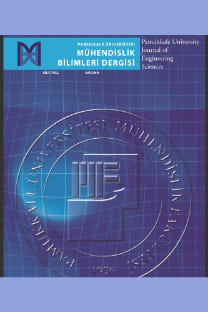Uçan nesnelerin otomatik tespit ve takibi için yeni bir yaklaşım
Otomatik hedef tespiti, Video takip, Etkileşimli çoklu model, Olasılıksal modelleme
A novel approach for automatic detection and tracking of flying objects
Automatic target detection, Video tracking, Interacting multiple model, Probabilistic data association,
___
- Cao X, Yang L, Guo X. "Total variation regularized RPCA for irregularly moving object detection under dynamic background". IEEE Transactions on Cybernetics, 46(4), 1014-1027, 2016.
- Rozantsev A, Lepetit V, Fua P. “Detecting flying objects using a single moving camera”. IEEE Transactions on Pattern Analysis and Machine Intelligence, 39(5), 879-892, 2017.
- Chandran R, Raman N. “A review on video-based techniques for vehicle detection, tracking and behavior understanding”. International Journal of Advances in Computer and Electronics Engineering, 2(5), 07-13, 2017.
- Xu Y, Dong J, Zhang B, Daoyun X. "Background modeling methods in video analysis: A review and comparative evaluation". CAAI Transactions on Intelligence Technology, 1(1), 43-60, 2016.
- Chen M, Wei X, Yang Q, Li Q, Wang G, Yang MH. “Spatiotemporal GMM for background subtraction with superpixel hierarchy”. IEEE Transactions on Pattern Analysis and Machine Intelligence, 40(6), 1518-1525, 2018.
- Elharrouss O, Abbad A, Moujahid D, Riffi J, Tairi H. “A block-based background model for moving object detection”. Electronic Letters on Computer Vision and Image Analysis, 15(3), 17-31, 2016.
- Maddelena L, Petrosino A. “Background subtraction for moving object detection in RGBD data: A survey”. Journal of Imaging, 4(5), 71, 2018.
- Barron JL, Fleet DJ, Beauchemin SS. “Performance of optical flow techniques”. International Journal of Computer Vision, 12 (1), 43-77, 1994.
- Colque RVHM, Caetano C, De Andrade MTL, Schwartz WR. “Histograms of optical flow orientation and magnitude and entropy to detect anomalous events in videos”. IEEE Transactions on Circuits and Systems for Video Technology, 27(3), 673-682, 2017.
- Kroeger T, Timofte R, Dai D, Van Gool L. “Fast optical flow using dense inverse search”. Computer Vision-European Conference on Computer Vision (ECCV) 2016, Amsterdam, The Netherlands, 11-14 October 2016.
- Zhang J, Ding Y, Xu H, Yuan Y. "An optical flow based moving objects detection algorithm for the UAV". IEEE 4th International Conference on Computer and Communication Systems, Singapore, 23-25 February 2019.
- Singh G, Saha S, Sapienza M, Torr P, Cuzzolin F. “Online real-time multiple spatiotemporal action localisation and prediction”. International Conference on Computer Vision (ICCV 2017), Venice, Italy, 22-29 October 2017.
- Liang R, Yan L, Gao P, Qian X, Zhang Z, Sun H. “Aviation video moving-target detection with inter-frame difference”. IEEE 3rd International Congress on Image and Signal Processing, Yantai, China, 16-18 October 2010.
- Zhu M, Wang H. “Fast detection of moving object based on improved frame-difference method”. IEEE 2017 6th International Conference on Computer Science and Network Technology, Dalian, China, 21-23 October 2017.
- Wei H, Peng Q. “A block-wise frame difference method for real-time video motion detection”. International Journal of Advanced Robotic Systems, 15(4), 1-13, 2018.
- Shi G, Suo J, Liu C, Wan K, Lv X. "Moving target detection algorithm in image sequences based on edge detection and frame difference". IEEE 3rd Information Technology and Mechatronics Engineering Conference (ITOEC), Chongqing, China, 3-5 October 2017.
- Pakfiliz AG. "Automatic detection of aerial vehicle in cloudy environment by using wavelet enhancement technique". Radioengineering, 26(4), 1169-1176, 2017.
- Gonzalez RC, Woods RE. Digital Image Processing. 2nd ed. New Jersey, USA, Prentice Hall, 2001.
- Han DS, Juan ROS, Jung MW, Cha HW, Kim HS. “Development of a novel fast rotation angle detection algorithm using a quasi-rotation ınvariant feature based on sobel edge”. Journal of Telecommunication, Electronic and Computer Engineering, 9(2-6), 33-36, 2017.
- Bar-Shalom Y, Li XR. Multitarget-Multisensor Tracking: Principles and Techniques. Connecticut, USA, YBS Publishing, 1995.
- Bar-Shalom Y, Li XR, Kirubarajan T. Estimation with Applications to Tracking and Navigation: Theory, Algorithms and Software. New York, USA, Wiley, 2001.
- Rashid M, Sebt MA. “Tracking a maneuvering target in the presence of clutter by multiple detection radar and ınfrared sensor”. 2017 Iranian Conference on Electrical Engineering (ICEE), Tehran, Iran, 2-4 May 2017.
- Gupta S, Mazumdar SG. “Sobel edge detection algorithm”. International Journal of Computer Science and Management Research, 2(2), 1578-1583, 2013.
- Stone LD, Streit RL, Corwin TL, Bell KL. Bayesian Multiple Target Tracking. 2nd ed. MA, USA, Artech House, 2013.
- Li X, Willett P, Baum M. and Y. Li, "PMHT approach for underwater bearing-only multisensory-multitarget tracking in clutter". Journal of Oceanic Engineering, 41(4), 831-839, 2016.
- Efe M, Ruan Y, Willett P. “The pedestrian PMHT". Fifth International Conference on Information Fusion, Annapolis, MD, USA, 8-11 July 2002.
- ISSN: 1300-7009
- Başlangıç: 1995
- Yayıncı: PAMUKKALE ÜNİVERSİTESİ
İlişkisel veri tabanlarında XML veriler için Homoglif dönüşüm tabanlı damgalama
Mustafa Bilgehan İMAMOĞLU, Mustafa ULUTAŞ
Otomotiv akülerinde problem tespitine yönelik hücresel ölçüm ve hata teşhis sistemi
Osman DEMİRCİ, Burcu ACAR DEMİRCİ, Sezai TAŞKIN
Değişken hızlı rüzgâr türbinleri için geri adımlamalı doğrusal olmayan bir denetleyici tasarımı
Kararlı durumda seri kapasitörlerin iletim şebekesine etkilerinin incelenmesi
Doğan Can SAMUK, Fatih Mehmet NUROĞLU
Kutuplaştırılmış veri üzerinde ikili sınıflandırma için sürekli zamanlı eşik değeri belirleme
Ali SAĞLAM, Nurdan AKHAN BAYKAN
Şebekeden bağımsız hibrit sistemin (rüzgar-fotovoltaik) performans analizi
Oktay ARIKAN, Evren İŞEN, Bedri KEKEZOĞLU
Tarımsal alanlarda yüksek çözünürlüklü IKONOS uydu görüntüsünden nesne-tabanlı ürün deseni tespiti
Beste TAVUS, Kamil KARATAŞ, Mustafa TÜRKER
Uçan nesnelerin otomatik tespit ve takibi için yeni bir yaklaşım
Yazılım geliştirme taleplerinin metin madenciliği yöntemleriyle önceliklendirilmesi
